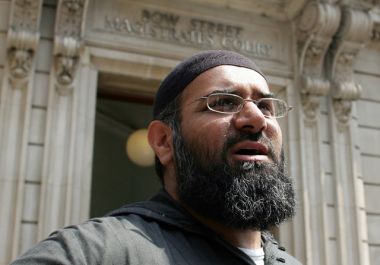Media and 'culture warriors' allowed Anjem Choudary to thrive, says UK's biggest Muslim group
The Muslim Council of Britain (MCB) has blamed the media – not Muslims – for giving Anjem Choudary the "oxygen of publicity" and allowing him to spread his message of hate far wider than he could in mosques.

In an article for the Guardian, Miqdaad Versi, spokesperson for the Muslim Council of Britain (MCB) on security issues, said: "His pulpit was not to be found in mosques but on the television screen and in national newspapers".
The leader of the extremist group al-Muhajiroun is believed to have influenced at least 100 people into terrorism.
Versi added: "Choudary's notoriety allowed him to reach the impressionable and vulnerable young people who felt alienated from the rest of society."
The representative of Britain's biggest Muslim umbrella group went on criticise the government's counter-extremism strategy as counter-productive. "Choudary's imprisonment is also a reminder of the shoddy state of counter-extremism in Britain," Versi wrote. "For years successive governments have struggled to define what extremism is and who they are trying to confront. Hasty and ill-thought-through measures have alienated the very Muslims who have kicked out extremists such as Choudary from their mosques."
Versi also hit out at "ideologues" who influenced government and pursued a divisive "culture war", misunderstanding the nature of conservative Islam. "The counter-extremism fight has become a casualty of an ongoing culture war pursued by ideologues with the ear of the government, bent on denying public space to Muslims who organise themselves," he said.
"It is one that wrongly paints the life and practice of many Muslims as 'conveyor-belts' to violence with the assumption that the more conservative you are, the more prone you are to extremism."
Choudary, 49, and his close associate Mizanur Rahman, 33, were convicted at London's Old Bailey of using online lectures and messages to encourage backing for ISIS, which controls large parts of Syria and Iraq.
Prosecutors said that in postings on social media, Choudary and Rahman had sought to validate the self-proclaimed "caliphate" declared by ISIS leader Abu Bakr al-Baghdadi and that Muslims had an obligation to obey or provide support to him.
Both men were found guilty last month, but their convictions could not be reported until this week for legal reasons. The men, who denied the charges, are due to be sentenced in September.
Following years in which he avoided arrest despite his apparent sympathy for extremism and links to some of Britain's most notorious terrorists, Choudary was convicted after jurors heard he had sworn an oath of allegiance to ISIS.
Choudry had links to one of the men who killed Lee Rigby in 2013, Michael Adebolajo, and the Islamist militant Omar Bakri Muhammad.
Choudary and Rahman face up to 10 years in jail for inviting support for a proscribed organisation.
Fears over Choudary's ability to radicalise fellow inmates mean that he could be held in an isolated cell.











